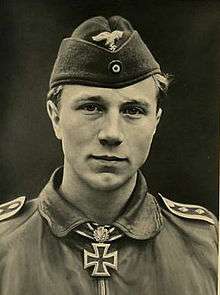Franz-Josef Beerenbrock
| Franz-Josef Beerenbrock | |
|---|---|
 Franz-Josef Beerenbrock | |
| Born |
9 April 1920 Datteln, Germany |
| Died |
13 December 2004 (aged 84) Olfen, Germany |
| Allegiance |
|
| Service/branch |
|
| Years of service | 1938–45 |
| Rank | Leutnant |
| Unit | JG 51 |
| Battles/wars |
World War II |
| Awards | Knight's Cross of the Iron Cross with Oak Leaves |
Franz-Josef Beerenbrock (9 April 1920 – 13 December 2004) was one of the most successful German fighter aces of World War II. He was also a recipient of the Knight's Cross of the Iron Cross with Oak Leaves (German: Ritterkreuz des Eisernen Kreuzes mit Eichenlaub). The Knight's Cross of the Iron Cross and its higher grade Oak Leaves was awarded to recognise extreme battlefield bravery or successful military leadership. Beerenbrock claimed 117 aerial victories in approximately 400 combat missions, all on the Eastern Front. In November 1942 he became a Prisoner of War for the rest of the war in Russia.
In the Luftwaffe
Beerenbock joined a flak artillery unit on 1 October 1938 and in 1939 was trained as a pilot. In March 1941, Beerenbrock was transferred to 12./Jagdgeschwader 51 (JG 51). Unteroffizier Beerenbrock was soon promoted to Oberfeldwebel.
He achieved his first aerial victory on 24 June 1941. On 1 August 1942 he claimed nine more victories and reached his 100th aerial victory often flying as wingman of Karl-Gottfried Nordmann. He was the 15th Luftwaffe pilot to achieve the century mark.[1] At that point he was the most successful fighter pilot of JG 51. He was awarded the Knight's Cross of the Iron Cross with Oak Leaves.
In air combat on 9 November 1942 with numeralically superior Russian fighters over Welish, he downed three Russian fighters but his Messerschmitt Bf 109 F-2 fighter received a hit in the radiator and he went down over Russian-held territory and was taken prisoner of war.
A few days later, the Russian fighter units in this area suddenly started using the very same tactics as Beerenbrock had used with such success. Some of Beerenbrock's old friends in JG 51 were certain. Beerenbrock, who had a Russian mother, has gone over to the Russian side, although there are no facts and is merely speculation. It has been said that Beerenbrock in Russian captivity was one of the founders – together with General Walther von Seydlitz-Kurzbach and others – of the well-known pro-Soviet German prisoners' organisation, the League of German Officers (German: Bund deutscher Offiziere), but this also is only speculation.
Several years after the war in mid-December 1949 Beerenbrock returned to West Germany. In 1955 he joined the Luftwaffe as an officer of the Bundeswehr.
Franz-Josef Beerenbrock was credited with 117 victories in approximately 400 missions, all on the Eastern Front of which at least 12 were Il-2 Sturmoviks.[2]
Awards
- Iron Cross (1939)
- Ehrenpokal der Luftwaffe (15 September 1941)[4]
- German Cross in Gold on 17 June 1942 as Feldwebel in the IV./Jagdgeschwader 51[5]
- Knight's Cross of the Iron Cross with Oak Leaves
- Knight's Cross on 6 October 1941 as Unteroffizier and pilot in the 10./Jagdgeschwader 51[6][7]
- 108th Oak Leaves on 3 August 1942 as Oberfeldwebel and pilot in the 10./Jagdgeschwader 51 "Mölders"[6][8]
References
Citations
Bibliography
- Bergstrom, Christer. Red Star – Black Cross: Russian and German Fighter Pilots in Combat 1941–1945
- Fellgiebel, Walther-Peer (2000) [1986]. Die Träger des Ritterkreuzes des Eisernen Kreuzes 1939–1945 — Die Inhaber der höchsten Auszeichnung des Zweiten Weltkrieges aller Wehrmachtteile [The Bearers of the Knight's Cross of the Iron Cross 1939–1945 — The Owners of the Highest Award of the Second World War of all Wehrmacht Branches] (in German). Friedberg, Germany: Podzun-Pallas. ISBN 978-3-7909-0284-6.
- Obermaier, Ernst (1989). Die Ritterkreuzträger der Luftwaffe Jagdflieger 1939 – 1945 [The Knight's Cross Bearers of the Luftwaffe Fighter Force 1939 – 1945] (in German). Mainz, Germany: Verlag Dieter Hoffmann. ISBN 978-3-87341-065-7.
- Patzwall, Klaus D.; Scherzer, Veit (2001). Das Deutsche Kreuz 1941 – 1945 Geschichte und Inhaber Band II [The German Cross 1941 – 1945 History and Recipients Volume 2] (in German). Norderstedt, Germany: Verlag Klaus D. Patzwall. ISBN 978-3-931533-45-8.
- Scherzer, Veit (2007). Die Ritterkreuzträger 1939–1945 Die Inhaber des Ritterkreuzes des Eisernen Kreuzes 1939 von Heer, Luftwaffe, Kriegsmarine, Waffen-SS, Volkssturm sowie mit Deutschland verbündeter Streitkräfte nach den Unterlagen des Bundesarchives [The Knight's Cross Bearers 1939–1945 The Holders of the Knight's Cross of the Iron Cross 1939 by Army, Air Force, Navy, Waffen-SS, Volkssturm and Allied Forces with Germany According to the Documents of the Federal Archives] (in German). Jena, Germany: Scherzers Militaer-Verlag. ISBN 978-3-938845-17-2.
- Thomas, Franz (1997). Die Eichenlaubträger 1939–1945 Band 1: A–K [The Oak Leaves Bearers 1939–1945 Volume 1: A–K] (in German). Osnabrück, Germany: Biblio-Verlag. ISBN 978-3-7648-2299-6.

